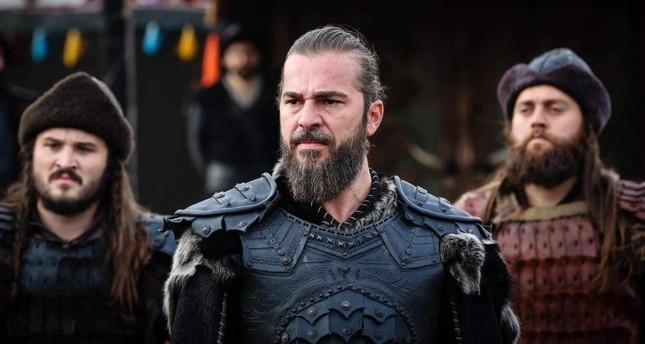
Turkish TV series 'Resurrection: Ertuğrul' resonates among Kashmiris
by ANADOLU AGENCYOnce annoyed at his colleagues' hourslong discussions of a Turkish TV series, Kashmiri public relations professional Mukhtar Ahmad Baba was shocked to find the show was not simply an imitation of Indian soap operas.
Hooked after watching the first episode of "Resurrection: Ertuğrul," Baba, like many Kashmiris, binge-watched the acclaimed historical drama – a great feat considering its 150 episodes, which when played back to back take 10 days to finish.
Fast becoming Turkey's main cultural export to the Indian-administered region, many Kashmiris find "Resurrection: Ertuğrul" to be highly relatable.
Set around the deeds of 13th-century Ertuğrul Gazi, a warrior and the father of Osman, the founder of the Ottoman Empire, it depicts the struggle between a minority group of Turkish nomads in Anatolia against a myriad of adversaries, from Christian crusaders to Mongol invaders.
Baba's takeaway was: "Every Kashmiri must watch it. A small tribe of 2,000 people triumph. It's inspirational. If you have a goal and the will to achieve it, nothing can come in your way."
Why would a Turkish series resonate among Kashmiris, especially in their history's most troubled phase? Writer Najeeb Mubarki said Kashmiris watch the series as entertainment but also absorbed its political message.
"We might be a landlocked place, besieged, but we have always been receptive to what comes from the Muslim world and the narratives we can relate to. Ertuğrul definitely has a political agenda, like the Indian series on Hindu epics Ramayana and Mahabharata in the mid-80s," Mubarki said.
"Mustafa Akkad – director of renowned historical films including "Lion of the Desert" and "The Message" – was well received in Kashmir even as unrest against India boiled over in the late 1980s," Mubarki added.
The political subtext of the series so appealed to Ahmad Raafi, a publishing executive, that he "couldn't help laughing with the characters when they laughed and crying when they cried."
Raafi said he watched all 150 episodes within 50 days last summer and mentally connected each of the characters to someone in Kashmir.
"The best thing about the series is that no matter what, (it shows) that people fighting for a just cause should never lose hope. Surrendering is never an option," he said.
Faraz, an academic, calls himself "Ertuğrul watchers' watcher." He takes pride in being among the select few who had watched the series before its popularity washed over the region.
"Most youngsters immediately see this as a break from what they have been watching. For example, the Knights Templar, who are valorized in western productions, are shown in a different light but without demonizing all Christians. For once, Muslims are not the other," he said.
Cultural appeal
Faraz added that "Resurrection: Ertuğrul" was the story of a small group's struggle against internal and external enemies.
"Films like 'Braveheart' and 'The Patriot' evoke similar feelings among oppressed people like Kashmiris, but 'Ertuğrul' appeals to Kashmiris at the cultural level," he said, adding that the actors' customs and mannerisms resembled those of Kashmiris.
Muhammad Irfan, who watched the series more than two years ago, said Kashmiris found it cathartic because it "ends in a victory," something he added that the Muslim world had not seen since the Industrial Revolution.
Echoing Irfan, Wasim Ahmad, an orchardist, said the timing of watching it was important.
"We had been annexed when I watched it. My father and I would watch it every day from morning to 2 (o'clock) in the afternoon. The series' recurring themes are struggle, tyranny, oppression, suffering, identity and justice. That makes it our story too," Wasim said.
Flash drives carrying "Resurrection: Ertuğrul" soon began exchanging hands last year after New Delhi placed Kashmir under continuous lockdown having scrapped constitutional provisions providing a certain degree of autonomy and protecting the region's demographic character.
Ertuğrul's influence has started manifesting in daily life. In moments of exaltation, friends greet each other with exaltations used by its characters, with some using its signature music as their ring tones. According to Irfan, those who have internet access searched the web to see the actors' appearance in real life. Nazir Ahmad, an education official, said he had gotten a cap custom-made with the symbol of the Kayı – the tribe Ertuğrul Gazi led – emblazoned on it.
A few people have even become known for being able to procure the latest episodes. Irfan Fazıl, a Ph.D. student at the University of Kashmir, is one of them. Noticing that most watchers were youngsters who could not afford laptops but had smartphones, he bought a 128-gigabyte cellphone-compatible flash drive and filled it with all five seasons.
"They watch it on their phones now. The demand is growing by the day. Many adults have requested the Urdu-dubbed version. It has become easier for me also. I no longer have to carry those bulky hard drives," Fazıl said.